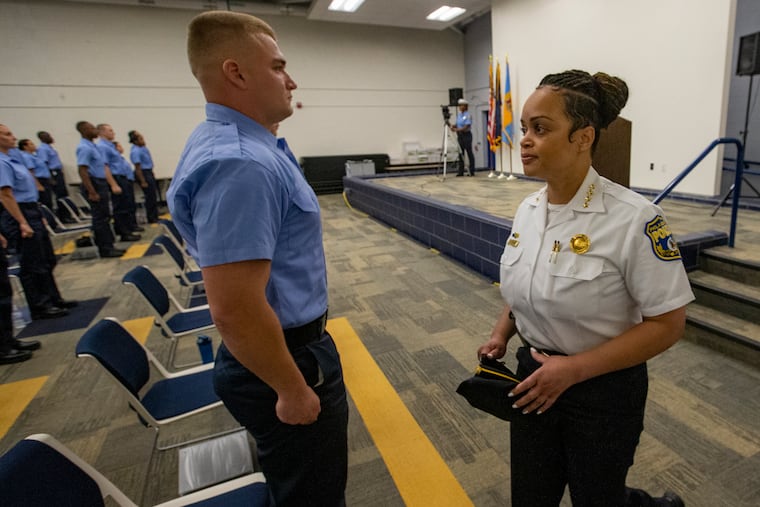Police recruiting is down across the country. ‘We are working in a movement,’ Philly’s top cop tells the incoming class.
The flow of incoming recruits stopped when the pandemic hit, and police forces nationally have struggled to attract and retain officers amid a national debate about policing.

The Philadelphia Police Department on Monday began training its first class of new recruits in more than a year, a step that comes as the agency — much like law enforcement nationwide — has struggled to attract and retain officers amid an ongoing debate over criminal justice reform and the role of policing.
Commissioner Danielle Outlaw addressed the 48 aspiring officers early Monday at the department’s training center in Northeast Philadelphia, telling them to “be mindful” that “we are working during a movement.” Still, she mostly encouraged the group to embrace the challenges awaiting them during their nine-month stint at Police Academy. She also recalled how her father was once apprehensive about her becoming a cop in her hometown of Oakland, Calif., before growing to appreciate her career choice.
“Whatever your support system is, whatever your hobbies are, whatever things you do right now, today, to keep you grounded, don’t lose that,” Outlaw said.
Before March 2020, the Police Department tended to train several new classes of at least a few dozen recruits per year, creating a pipeline of younger officers that would join the ranks as veterans resigned or retired. Applicants must complete a series of tests, including physical exams, drug screenings, and a psychological evaluation, before being selected for 30 weeks of training. Graduating officers, paid a salary of about $58,000, are then generally assigned to patrol one of the city’s 21 police districts for a year.
But the flow of incoming recruits stopped when the pandemic hit, and Outlaw said it was slow to resume partly because some third-party vendors the department used to screen potential officers weren’t prepared to operate in a remote-first environment.
At the same time, police forces nationally began facing recruiting and retention challenges after then-Minneapolis officer Derek Chauvin killed George Floyd, sparking a nationwide discussion about policing and whether cities should divert funding from their departments.
The Police Executive Research Forum, a Washington-based think tank, surveyed 200 departments in May and found that hiring had decreased slightly between 2020 and 2021 compared with the same period a year earlier. Officer resignations were up 18% and retirements increased by 45%.
In Philadelphia — where shootings and homicides over the last year have hit a decades-long high — Mayor Jim Kenney’s office said the Police Department currently has 6,012 officers, 368 short of its budgeted target. And while retirements have slowed this year compared with the first half of 2020, the number of officers accepted into the city’s Deferred Retirement Option Program — in which municipal workers signal their intention to retire within four years — is roughly five times higher through Thursday than compared with same time frame last year.
Meanwhile, the department has had to alter how it recruits potential officers. The city last year enacted a law requiring all municipal workers to have lived in Philadelphia for at least a year before their hiring.
Outlaw said that “can make it a bit of a challenge” because it limits the potential pool of applicants. But she said she’s “optimistic” that “we’ll still continue to see our interest and our candidate pools at a reasonable number.”
Meanwhile, District Attorney Larry Krasner said at an unrelated news conference Monday that the police force is already too big. And while he hopes that the new recruits are joining the force with aspirations of improving the profession, he said adding officers isn’t a solution to the city’s rising violence — which he has routinely said must be addressed with a broader approach not centered on policing.
“There are many different ways to police,” Krasner said, “but simply putting more boots on the ground has very clearly failed to solve the long-term problems that cause crime in Philadelphia.”
Outlaw said the 48 recruits in this class include 15 people who identify as Black, 18 who are white, 12 identify as Hispanic, and a quarter of whom are women — providing a level of diversity that Outlaw wants to continue to bring to the force. In 2020, about 55% of the Police Department’s employees were white, according to the city’s annual workplace diversity report, a third were Black, and about 10% were Hispanic.
Devon Ford, 26, and Angelina Caporiccio, 28, were among the recruits donning their plain blue uniforms Monday. They said they were eager to get started.
“I can be someone that kids who look like me, and from my community, can follow,” said Ford, who is Black and from West Philadelphia. “I feel like I can make an impact.”
-Staff writer Mensah M. Dean contributed to this article.